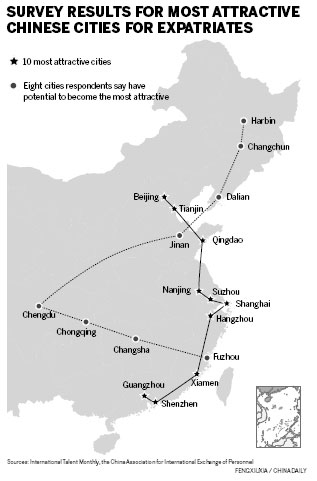
|
Regional disparity in attracting foreign talent to China is highlighted by survey results released on Wednesday showing that inland areas have a long way to go in attracting professionals from overseas. All 10 of the cities considered the most attractive by expatriates are in eastern China, the survey shows. The top 10 comprises Shanghai, Beijing, Tianjin, Guangzhou, Shenzhen, Xiamen, Nanjing, Suzhou, Hangzhou and Qingdao, according to the survey. It was conducted by the Beijing magazine International Talent Monthly and the China Association for International Exchange of Personnel. In the previous two surveys in 2011 and 2012, cities in eastern China also topped the list. About 72,000 expatriates and English-speakers took part in this year's survey through questionnaires or by voting on the China Daily website. Of the eight cities recognized by respondents as having high potential to become the most attractive for foreigners in China, only three are in central or western areas - Changsha, Chongqing and Chengdu. William Brown, who started teaching at Xiamen University in the late 1980s and received a Chinese "green card" in 1992, said: "Some (Chinese) cities are simply too remote for many foreigners. "However, the western development programs are rapidly giving inland provinces easy access to the rest of China and the world." Robin Wales, mayor of Newham, a borough in east London, said he believes it is important for Chinese cities to conduct research to understand their strengths and weaknesses and to try to lure global talent through their unique identities. "If you want to attract talent, you need to offer something unique," he said. Shanghai beat 29 rival cities in the survey with the highest recognition in terms of working and living environment, an expatriate-friendly policy, and administrative capacity. Stuart Dunn, a Briton who has lived in Shanghai for four years, said it is an attractive place, with a very low crime rate and reasonable cost of living compared with major cities in the West. "Shanghai has great arrangements for sports events, and the entertainment and social life here are exciting. It's not only a center for business, but also for culture and fun," said Dunn, who manages a bar chain. He said he lived in the Middle East before coming to Shanghai and believes China offers more cultural diversity. Although Shanghai and Beijing scored the highest points overall, they scored the lowest on environment. Beijing was shrouded in severe smog for weeks early this year, with pollutants from vehicle emissions, coal- burning in neighboring regions and construction dust. The serious pollution raised public awareness and prompted the government to take emergency measures. Jon Michael Davis, president and chief executive officer of the National Institute of Clean-and-Low-Carbon Energy, said he chose Beijing as his favorite Chinese city for its robust business and culture. About 550,000 foreigners were working in China last year, the State Administration of Foreign Experts Affairs says. A survey released in October by HSBC that polled 7,000 expatriates in 37 countries and regions found that China is the favorite destination for expatriates this year. Despite the economic slowdown, this survey shows China has strong appeal for career-minded expatriates, with nearly 70 percent of respondents saying they moved to the country for better job opportunities. In the survey results released on Wednesday, respondents who answered questionnaires to choose the most attractive Chinese cities to work in, said problems such as children's education, medical care and visa policies make it difficult for them to work in China for the long term. Some also said they want to see more expatriate-friendly policies to help them better integrate into Chinese society, such as pension programs and housing benefits for foreigners. Philipp Khaytovich, who took part in the survey, said: "There is no retirement plan or obligatory medical care for foreigners paid for by their employers. There are no housing benefits, such as low-interest housing loans, available to foreigners." Khaytovich, who works for the Shanghai Institutes for Biological Sciences, suggested that China should allow foreigners who have worked in the country for more than three years to enjoy the same social and economic benefits as local residents. "The easiest way would be to make the hukou (housing registration) system open to long-term foreign residents, based on their education and work value," he said. |
11月6日發布的一項調查結果表明,在吸引外籍人才來華方面,區域差異較為顯著,內陸地區在吸引海外專業人才上還有很長一段路要走。 調查顯示,最吸引外籍雇員的十大城市都位于中國東部。 根據這項調查,前十位包括上海、北京、天津、廣州、深圳、廈門、南京、蘇州、杭州和青島。 這項調查是由北京雜志《國際人才交流》月刊和中國國際人才交流協會共同進行的。
約有72000名外籍雇員和講英語的人士參加了今年中國日報的網上問卷投票。
“但是,西部大開發項目的實施正迅速使內陸省份能夠更容易地與中國其他地方和世界交流。” 倫敦東部紐漢區的區長羅賓?威爾斯說,他認為中國城市應該研究各自的優勢和劣勢,通過自己的特性來吸引全球人才。
這次調查中,上海擊敗了29個競爭城市,在工作生活環境、外籍雇員政策優惠和行政能力方面被公認為是最好的。
鄧恩經營著一個連鎖酒吧,他說,“上海安排了很多體育賽事,娛樂和社會生活都很精彩,這里不僅是一個商業中心,也是一個文化娛樂中心。”
嚴重的污染引起了公眾的關注,并推動政府采取了緊急措施。
國家外國專家局稱,去年約有55萬名外國人在中國工作。
(譯者 真梨 編輯 丹妮) |